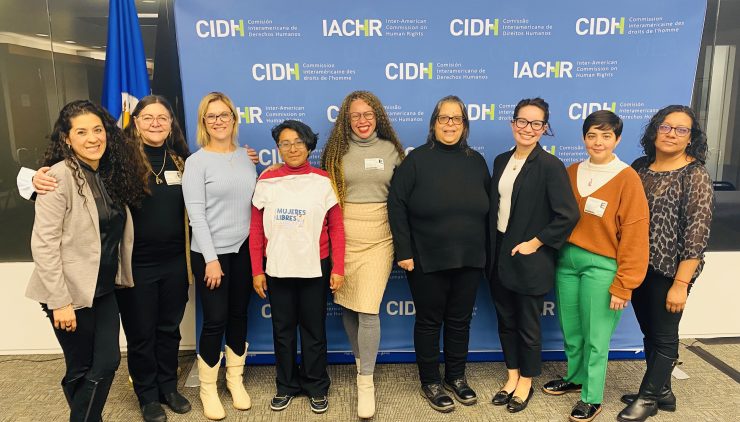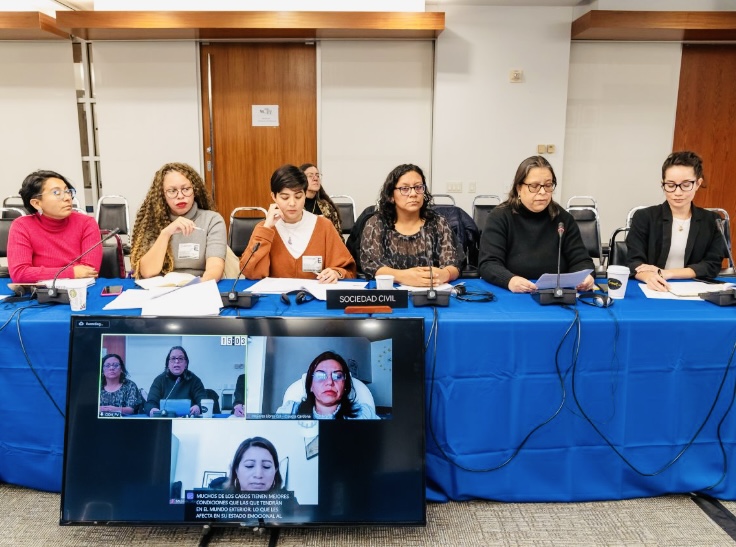This website uses cookies so that we can provide you with the best user experience possible. Cookie information is stored in your browser and performs functions such as recognising you when you return to our website and helping our team to understand which sections of the website you find most interesting and useful.
Vance Center’s Women in Prison Network Leads IACHR Hearing on Women Deprived of Liberty
March 2024The Vance Center’s Human Rights and Access to Justice program participated in a thematic hearing during the Inter-American Commission on Human Rights 189th Period of Sessions in Washington, DC.

Vance Center Staff Attorney Astrid Reyes (third from right) with presenters from the Women in Prison Network after the thematic hearing on the right to reintegration of women deprived of liberty, in Washington, DC, February 29, 2024. Photo: Vance Center
On February 29, Vance Center Staff Attorney Astrid Reyes joined representatives of partner organizations and members of the Women in Prison Network from across Latin America for a special session on the right to reintegration of women deprived of liberty.
During the hearing, the first ever held by the Commission specifically on this subject, Reyes and representatives of seven other organizations spoke about the many issues that currently and formerly incarcerated women in Latin America face upon completion of their sentences, including social stigma and discrimination, an absence of training and release preparation programs available to incarcerated women, limited or no access to fairly paid job opportunities, financial and educational discrimination, and the loss of family ties.
The Women in Prison Network, convened by the Vance Center in 2017, is made up of 50 advocates from 21 countries around the world. It is dedicated to examining the causes, conditions, and consequences of women’s incarceration and advocating for the incorporation of a gender perspective at all stages of the process, from criminal proceedings through and after completion of sentences and reintegration.
Reyes opened the hearing with an introduction to the Women in Prison Network, and introduced the other speakers, representing:
- Colectivo Artesana (Guatemala)
- Red NOVI (Guatemala)
- Elas Existem – Mulheres Encarceradas (Brazil)
- Mujeres Libres El Salvador
- Mujeres Libres Colombia
- EQUIS Justicia (Mexico)
- Corporación Humanas (Colombia)
Claudia Cardona, from Mujeres Libres Colombia, one of two presenters joining the hearing remotely, outlined the many forms of discrimination and exclusion from social services and the safety net that affect women released from prison. These include rejection by their own families and fracturing of family structures, limited access to safe housing, workplace discrimination and other impediments to accessing formal labor opportunities. She noted that this makes these women more vulnerable and prone to take on dangerous, exploitative work or fail to report unsafe working conditions or gender-based violence for fear of retaliation and losing their source of financial independence. Cardona also pointed to the lack of adequate medical care for women previously deprived of liberty, who often have additional medical conditions as a result of their incarceration.
Also joining remotely was Teodora Vásquez, representing Mujeres Libres El Salvador, a nonprofit organization made up of women formerly deprived of liberty that advocates for reintegration opportunities for women who have completed long sentences for obstetric emergencies, including miscarriages. Vásquez outlined the harsh laws in El Salvador that criminalize women for such obstetric emergencies, under a constitution that defines life as beginning at conception, and noted that these laws have resulted in hundreds of women imprisoned for crimes they did not commit. She said that these women face a “double sentence” – one at the hands of a judge, and the other from society – and concluded with an outline of the support that her organization offers women and a call for policy changes.
Andrea Barrios, from Colectivo Artesana in Guatemala, spoke about the double stigma that women face upon completion of their sentences and release from prison, noting that women deprived of liberty face widespread discrimination and limited job opportunities because of their gender and simply because they have a criminal record, regardless of the crime or the length of their sentence. She cited a survey of 200 formerly incarcerated women, which found that more than 50% were unable to find work after leaving prison; 26% worked in the informal labor economy, and the remainder were considering migrating to the United States to find work.

Presenters at the thematic hearing, February 29, 2024 (L-R): Viviana Rodríguez Peña, Corporación Humanas; Caroline Bispo, Elas Existem Mulheres Encarceradas; Alejandra Ramos, EQUIS Justicia; Sonia Acabal, Red NOVI; Andrea Barrios, Colectivo Artesana; Astrid Reyes, Vance Center. On screen: Claudia Cardona, Mujeres Libres Colombia; Teodora Vásquez, Mujeres Libres El Salvador. Photo: Vance Center
Barrios was followed by Sonia Acabal, from Red NOVI (Red de la No violencia contra las mujeres), a network of organizations that work with women survivors of violence and human rights defenders in Guatemala. Acabal emphasized the long-lasting impact of criminalization and incarceration on women human rights defenders and anti-corruption actors in Guatemala. She noted that former justice operators were unable to return to their careers, often because they are still subject to ongoing criminal cases and had only been released under substitutive measures. According to Acabal, the main obstacle to reintegration in these cases is the fact that these women have been deprived of liberty because of cases brought against them by the Guatemalan state, which is therefore uninterested in offering any support to address issues they face upon leaving prison.
Alejandra Ramos from EQUIS Justicia, a Mexican organization that works to change oppressive power structures and for greater inclusion for women, outlined the existing social services available for formerly incarcerated women in Mexico, noting that, while such programs and services do exist under federal law, the reality is that they are implemented inconsistently across different government agencies, and the majority of women are unaware of these programs or how to access them.
Caroline Bispo, a lawyer and criminologist and president of the feminist, abolitionist and anti-racist Brazilian organization Elas Existem – Mulheres Encarceradas, addressed the conditions for women deprived of liberty in the ever-expanding Brazilian prison system. She noted that the number of women incarcerated in Brazil has increased more than 560% over the last 15 years, many on drug charges. Despite this enormous increase in the prison population and carceral system, Bispo said that the Brazilian government has not invested in a parallel expansion of services to guarantee the rights of individuals leaving the system.
Viviana Rodríguez Peña, a lawyer at Colombian organization Corporación Humanas, concluded the presentation with four requests to the Commission: to continue the regional dialogue on women deprived of liberty, prioritizing input from formerly incarcerated women; collect information to stay up-to-date on the situation in each country; include this issue in ongoing monitoring of human rights in these countries and other Commission activities, such as country visits and reports; and to create a monitoring mechanism to hold states accountable for ensuring these rights.
The hearing highlighted the growing need for a holistic approach to reintegration, particularly in the context of an ever-growing prison population resulting from widespread punitive responses to social and security issues in Latin America.
The Women in Prison Network plans to continue advocating and presenting cases before the Inter-American and universal human rights systems to increase public awareness of the challenges women face as they come into contact with carceral systems with increasing frequency, and as they attempt to rebuild their lives afterwards.


